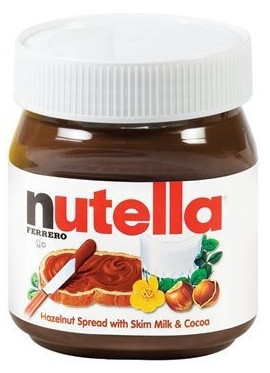Can Dogs Eat Nutella?

Nutella is a spreadable paste made with sugar, cocoa, milk, and hazelnut. These ingredients are all unnecessary and potentially dangerous additions to your dogs diet. Simply put, any food that contains cocoa (chocolate) should not be given to your dog.
There are two main reasons why Nutella should not be given to dogs.
Nutella Contains Cocoa (Chocolate)
One of the ingredients used to make Nutella is cocoa. The actual amount of cocoa contained inside a jar of Nutella is proprietary information. Therefore, it’s impossible for us to accurately determine the amount of cocoa added into the recipe.
Needless to say, any amount of cocoa is bad given that cocoa is toxic to dogs. From my experience working at the ASPCA Poison Control Center, Nutella most likely contains less cocoa than an average Hershey’s Milk Chocolate Bar.
Methylxanthines (theobromine and caffeine) are the chemicals found in cocoa that are dangerous for dogs to consume. One ounce of Nutella (two tablespoons) should contain less than 64 mg of methylxanthines per ounce. This would suggest that one ounce of Nutella is unlikely to cause any severe signs for a healthy 10-pound dog.
If we use 64 mg/oz as a liberal estimate of the concentration of Nutella, 3.5 or more ounces could potentially cause significant issues involving the heart and central nervous system (CNS). Any amount of Nutella could cause an upset stomach.
Common signs associated with the ingestion of chocolate include:
- Hyperactivity
- Anxiety
- Panting
- Vomiting
- Diarrhea
- Extremely rapid heart rate
- Arrhythmias
- Tremors
- Seizures
- Death
Nutella Contains Too Much Sugar and Fat
Nutella contains a whopping 21 grams of sugar and 12 grams of fat. Dogs have a difficult time digesting large amounts of sugar and fat. The most common symptom associated with the consumption of too much sugar and fat is an upset stomach. However, in some cases, an unusually high consumption of sugar and fat can lead to pancreatitis.
The risk of pancreatitis increases as the amount of sugar or fat increases. The signs of pancreatitis generally start within 24-48 hours of exposure and worsen over time.
Indicators of pancreatitis include:
- Prolonged vomiting
- Prolonged diarrhea
- Lack of appetite
- Stomach pain
- Dehydration
- Depression
What To Do If Your Dog Eats Nutella
Chances are slim that a dog will develop life-threatening issues after eating a small amount of Nutella. However, since other health problems are a concern, it is best to contact your local veterinarian or an animal poison control center for advice.
After a small ingestion, you can usually expect that your veterinarian will be able to walk you through treatment at home. However, be prepared to transport your dog to a local clinic for treatment if your dog swallows a large amount.
Aside from observing your dog for any indication of pancreatitis, your veterinarian may suggest any of the following treatments for larger ingestion:
- Inducing vomiting to remove the Nutella from the stomach.
- Administration of activated charcoal to prevent further absorption.
- Hospitalization to monitor for stimulatory signs, and to give IV fluids for the prevention of dehydration.
- Administration of medications to reverse any dangerous heart or CNS effects such as arrhythmias or seizures.
Pancreatitis itself can be life-threatening if left untreated. If you choose to observe your dog at home, you should immediately transport your dog to a veterinary clinic if you see any indication that pancreatitis has developed.
